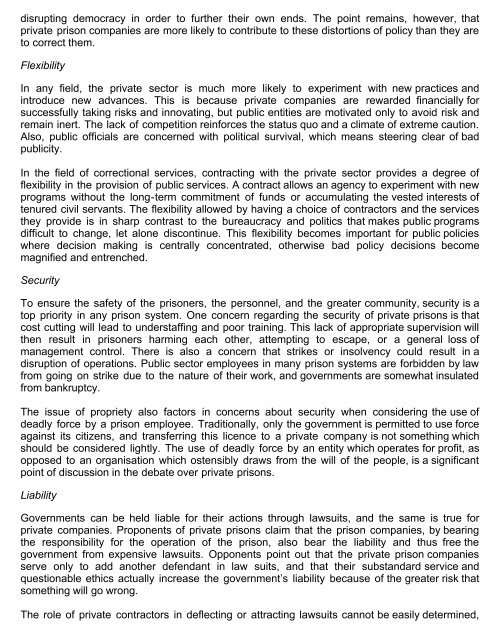prison privatisation in south africa issues, challenges and ...
prison privatisation in south africa issues, challenges and ...
prison privatisation in south africa issues, challenges and ...
You also want an ePaper? Increase the reach of your titles
YUMPU automatically turns print PDFs into web optimized ePapers that Google loves.
disrupt<strong>in</strong>g democracy <strong>in</strong> order to further their own ends. The po<strong>in</strong>t rema<strong>in</strong>s, however, that<br />
private <strong>prison</strong> companies are more likely to contribute to these distortions of policy than they are<br />
to correct them.<br />
Flexibility<br />
In any field, the private sector is much more likely to experiment with new practices <strong>and</strong><br />
<strong>in</strong>troduce new advances. This is because private companies are rewarded f<strong>in</strong>ancially for<br />
successfully tak<strong>in</strong>g risks <strong>and</strong> <strong>in</strong>novat<strong>in</strong>g, but public entities are motivated only to avoid risk <strong>and</strong><br />
rema<strong>in</strong> <strong>in</strong>ert. The lack of competition re<strong>in</strong>forces the status quo <strong>and</strong> a climate of extreme caution.<br />
Also, public officials are concerned with political survival, which means steer<strong>in</strong>g clear of bad<br />
publicity.<br />
In the field of correctional services, contract<strong>in</strong>g with the private sector provides a degree of<br />
flexibility <strong>in</strong> the provision of public services. A contract allows an agency to experiment with new<br />
programs without the long-term commitment of funds or accumulat<strong>in</strong>g the vested <strong>in</strong>terests of<br />
tenured civil servants. The flexibility allowed by hav<strong>in</strong>g a choice of contractors <strong>and</strong> the services<br />
they provide is <strong>in</strong> sharp contrast to the bureaucracy <strong>and</strong> politics that makes public programs<br />
difficult to change, let alone discont<strong>in</strong>ue. This flexibility becomes important for public policies<br />
where decision mak<strong>in</strong>g is centrally concentrated, otherwise bad policy decisions become<br />
magnified <strong>and</strong> entrenched.<br />
Security<br />
To ensure the safety of the <strong>prison</strong>ers, the personnel, <strong>and</strong> the greater community, security is a<br />
top priority <strong>in</strong> any <strong>prison</strong> system. One concern regard<strong>in</strong>g the security of private <strong>prison</strong>s is that<br />
cost cutt<strong>in</strong>g will lead to understaff<strong>in</strong>g <strong>and</strong> poor tra<strong>in</strong><strong>in</strong>g. This lack of appropriate supervision will<br />
then result <strong>in</strong> <strong>prison</strong>ers harm<strong>in</strong>g each other, attempt<strong>in</strong>g to escape, or a general loss of<br />
management control. There is also a concern that strikes or <strong>in</strong>solvency could result <strong>in</strong> a<br />
disruption of operations. Public sector employees <strong>in</strong> many <strong>prison</strong> systems are forbidden by law<br />
from go<strong>in</strong>g on strike due to the nature of their work, <strong>and</strong> governments are somewhat <strong>in</strong>sulated<br />
from bankruptcy.<br />
The issue of propriety also factors <strong>in</strong> concerns about security when consider<strong>in</strong>g the use of<br />
deadly force by a <strong>prison</strong> employee. Traditionally, only the government is permitted to use force<br />
aga<strong>in</strong>st its citizens, <strong>and</strong> transferr<strong>in</strong>g this licence to a private company is not someth<strong>in</strong>g which<br />
should be considered lightly. The use of deadly force by an entity which operates for profit, as<br />
opposed to an organisation which ostensibly draws from the will of the people, is a significant<br />
po<strong>in</strong>t of discussion <strong>in</strong> the debate over private <strong>prison</strong>s.<br />
Liability<br />
Governments can be held liable for their actions through lawsuits, <strong>and</strong> the same is true for<br />
private companies. Proponents of private <strong>prison</strong>s claim that the <strong>prison</strong> companies, by bear<strong>in</strong>g<br />
the responsibility for the operation of the <strong>prison</strong>, also bear the liability <strong>and</strong> thus free the<br />
government from expensive lawsuits. Opponents po<strong>in</strong>t out that the private <strong>prison</strong> companies<br />
serve only to add another defendant <strong>in</strong> law suits, <strong>and</strong> that their subst<strong>and</strong>ard service <strong>and</strong><br />
questionable ethics actually <strong>in</strong>crease the government’s liability because of the greater risk that<br />
someth<strong>in</strong>g will go wrong.<br />
The role of private contractors <strong>in</strong> deflect<strong>in</strong>g or attract<strong>in</strong>g lawsuits cannot be easily determ<strong>in</strong>ed,
















